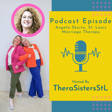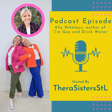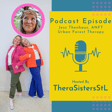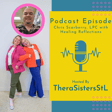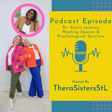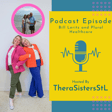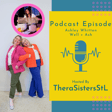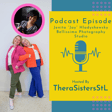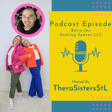Become a Creator today!Start creating today - Share your story with the world!
Start for free
00:00:00
00:00:01

Edie Rasmussen
TheraSistersStL had a fun and informative conversation with Edie Rasmussen; Edie is a licensed psychotherapist in St. Louis, MO. She works with individuals on a variety of issues, including coping with a late ADHD diagnosis, career and work performance issues, chronic medical issues, and trauma. She works with a lot of clients who have a history of people-pleasing and often find themselves feeling exhausted, burned out, and struggling with anxiety and overwhelming feelings.
Stay in touch with Edie HERE
Stay up to date with the TheraSistersStL HERE
Recommended
Transcript
Summer Highlights and Upcoming Plans
00:00:01
amycryan
Hi, how's it going? Yeah. Oh, hi, we're back. Hello! We have been enjoying our summer. Yeah, so we're a little off, but lots of things to talk about. Where do you want to start? Oh my gosh. My summer, we've been busy. I'm looking forward to next week going to Lawrence and my birthday and our mom's birthday, yes and seeing a new Jayhawk into her dorms. Yay, new Jayhawk! It'll be good. Yeah, how about you? Busy but travel, went to Michigan with the family. My husband said the family, so that was a wonderful Michigan go. um And then I went to Montreal with my old friends. We're all 50 until we went and celebrated 50 in Montreal.
00:00:49
amycryan
I need to go back. Montreal is wonderful. So I've never lived. It looks wonderful. It's
Introducing Edie Rasmussen, Therapist
00:00:54
amycryan
good. Cool. yeah So who do we have today? Today we have Edie and Edie Rasmussen.
00:01:01
amycryan
yeah Yeah, I'm really good at remembering first names, but not nice names. So we have Edie Rasmussen, she'll fix that for me, um who is a licensed professional therapist. And we'll get to talk to her today about healing and how she helps others heal. Sounds good. Come on in. Come on in, Edie. You get the metal seat. Yeah. Join us on our poops. That's our poops. Oh, your water. yes oh analog it's water
00:01:33
amycryan
so Oh yes, welcome Edie. So we are happy to have
ADHD Focus and Personal Transformation
00:01:38
amycryan
you. here um So a little bit of just what you've shared shared with us is you like to work with clients who have late diagnosis ADHD right and you like to work with them through career things and you also like to work with chronic pain working through some of that but also people-pleasing is kind of a big piece of the clients that you like to work with. So just jumping in, ro tell us a little bit about your practice and tell us a little bit about what you love about your work. well I've been in private practice since 2019. I started my private practice right before the pandemic
00:02:17
amycryan
convenient um I started out working with anxiety, really focus on focusing on anxiety and chronic health issues. But after being in private practice for a few years, I was diagnosed with ADHD and then I realized that I had already been working with a lot of women.
00:02:38
amycryan
with the symptoms. you know And this was before everyone started talking about women in ADHD. So about the time I was diagnosed and realized that I'd already been working with a lot of those clients, that's when you know the media really started talking about women in ADHD, and it kind of transformed my practice. And I started working almost exclusively with women who were either dealing with a late ADHD diagnosis, thought they might have ADHD, or they had had a diagnosis when they were young, but their ADHD hadn't really been treated.
00:03:19
amycryan
And so that's what I've been doing mostly. Did you find, it seems to me there's a big connection with anxiety and ADHD?
ADHD, Anxiety, Depression, and Trauma: Connections
00:03:30
amycryan
Yeah. Yeah. um You know, what I'm finding with clients and what I've experienced myself is that anxiety and depression and also things like OCD can be part of ADHD and those things something that co-occur. And the other thing that I think is really important to mention is that trauma is in most of the ways part of that equation as well because being neurodivergent in a society that's been set up for neurotypicals causes trauma. So there's a lot of shame and confusion okay and adverse life experiences and trauma that my clients bring to therapy me that is directly related to them.
00:04:13
amycryan
being neurodivergent. So tell me more about that just in when you say trauma in being a neurotypical world being neurodivergent like what are maybe some examples of trauma because you know how when people think of trauma they might think of something different than angry yeah how you So neurodivergent kids are much more likely to be able to leave. So almost every neurodivergent woman I see in my practice has had experiences with being able to leave.
00:04:43
amycryan
um Some, you know, depending on what what the issues are with someone's neurodivergence with their children, they're more likely to be yelled at by teachers and parents because adults in their life don't necessarily understand their symptoms if they're not diagnosed and so they become frustrated because they don't know what to do and that may come out, you know.
00:05:06
amycryan
because yelling and in extreme cases, physical abuse, because they don't have the tools to deal with that child sometimes. And if they were late diagnosed too, they don't know right that their children are struggling with it at that time. yeah yeah and then And one more thing is that, you know especially for neurodivergent women, they're much more likely to andbuive relationships as teenagers romantic
00:05:39
amycryan
houseor awesome what What was that about, I guess? Low self-esteem was the most I've always heard of ADHD. And low self-esteem can lead to choosy burners who are the best burners for us. I'm learning a lot. like Just about myself, I'm listening to you talk, and as a woman who was late diagnosed ADHD, and I'm starting to reflect on my adolescence and childhood and go, oh, okay.
00:06:08
amycryan
That's why, or that gives me more understanding. And just listening to you talk about the trauma piece, I'm like, oh yeah, I was in an abusive relationship like freshman year in high school. and Yeah, so you're hitting on a lot of things that I can relate to, so. Sure. And you know women with ADHD are often highly sensitive, and they're very, very kind. and And there can be some naivete associated with that. and so those girls or women may let people into their lives that maybe they shouldn't be or maybe they don't have great boundaries in that way because
00:06:46
amycryan
So you're doing some good work there. I can't.
Understanding EMDR Therapy
00:06:50
amycryan
And so, do you have any special techniques or skills that you use to help your clients? Well, um I use a lot of EMDR therapy. That's what I spend, I say, most of my time doing.
00:07:05
amycryan
with clients and... And remind me, what does EMDR stand for? It stands for eye movement desensitization reprocessing. It's a specific kind of therapy that was developed for trauma, but really it could be used for just about any problem that someone brings to therapy. And it uses something called bilateral stimulation.
00:07:29
amycryan
which helps your brain make new connections that it hasn't been able to make before. And bilateral stimulation is simply, like if you've ever taken a walk, you've done bilateral stimulation. It just leads back and forth, right? So when you're doing EMDR therapy, you're either going to be doing eye movements or you're going to be doing some hand tapping. Do you have, I know some people use tappers or they use different things that you hope will hurt.
00:07:53
amycryan
There's sometimes there's other tools involved too. You don't need that sometimes. you can just be Yeah, I don't use any of those and and in my training they said you don't need those. You can use them if you want, but they're not necessary. What does the bilateral do?
00:08:07
amycryan
The bilateral stimulation somehow frees your brain up to make a new connections. So if you've ever taken a walk to clear your mind, yeah you know and you've had that feeling that you were able to solve a problem, after you took that walk or you were able to get some clarity on something after you took that walk, that bilateral stimulation is probably the one that's helping you. Interesting. That was cool. Because of the bot...
00:08:34
amycryan
What is happening with that bilateral movement? Like there's neuron connections that are happening or like synapse what's happening? You know, possibly to helping the brain create new neural pathways. you know So what happens when we are triggered by something that is related to trauma is that your brain is making a mistake.
00:08:57
amycryan
So if you get anxious every time your boss calls you into your office and you get this overwhelming anxiety like ordering on panic, your brain is making a mistake because that's obviously not necessarily a situation that you should feel that anxious about. And so EMDR is really good at finding what's at the root.
00:09:19
amycryan
of that and helping your brain make new connections so that you're no longer triggered by that situation, creating those new neural pathways. Okay, so that makes sense. And thinking from an OCD stand standpoint, right when we have those first experiences of panic or trauma and that certain situation right then triggers ongoing ones, you're creating, your brain is kind of creating this habit, or this automatic response, and so then that EMDR and that bilateral helps to change that. Okay, that makes a lot of sense. okay And then I am really committed to helping my clients have a team of providers well that can help them through that ADHD journey, and I think this is just incredibly important. So I want them to have a primary care physician that
00:10:14
amycryan
that they trust, that they feel comfortable with and understands ADHD and trauma. I want them to have a psychiatric provider. that that understands how ADHD presents in women who can manage their medication. And then a lot of people don't realize that occupational therapy is available to adults with ADHD. If you're struggling with things like procrastination, completing tasks, social themes, your organization, you can see an occupational therapist to help you with those things.
00:10:47
amycryan
having that team of people you know and your mental health provider. Having that team you know in your corner can be so helpful. It can be really overwhelming.
00:11:04
amycryan
to think of all the things, right? Because I think you know some women, they respond with ADHD in this to-do list that is overwhelming and this idea that they have to do it right then. and But they can't prioritize it. Right. And then thinking they have to do it kind of all on their own because if they ask for help, that connects to maybe that shame or embarrassment. And so it's good that you can help facilitate that and support that so that they know they're not alone. and they don't have to do it all alone. Yes. And I, you know, I even say that on my website. You don't have to do this alone. You're not alone in this. right. You can have a team of people helping you do this. Yeah. Yes. Very good. Yeah. Do you have... Well, it sounds like you probably have a list of a bunch of providers that you rely on, that you kind of and see who would fit where, and we offer referrals, and that's awesome. Yeah, I really love connecting clients with other providers that can build them. That's great. And then the chronic pain piece, do you use the MDR to help you work with clients who have chronic pain? Oh, chronic medical issues, which is including including chronic pain. MDR, there's some really exciting work,
00:12:24
amycryan
and talk in that research community about chronic medical issues. So there's an emotional component to every medical issue. And EMDR is really good at at addressing that that emotional piece. And so it doesn't mean that EMDR is gonna cure your medical issue, but it can reduce your symptoms, it absolutely can. It's being used to treat things like long haul COVID.
00:12:52
amycryan
hu And, you know, considering how much anxiety is involved in breathing issues, that makes a lot of sense. It's being used to treat, right? So that's a very exciting area. Yeah, and I think too just, you know, it talks to the connection of emotional well-being mental health and our body, right? And so if we aren't anxious about, you know, our medical struggles, we're going to be tighter, right? And maybe not sleep as well, or, yeah. And so to be able to release that can help. Yes. That makes sense. And the NDDR is really good at getting at that semantic piece, those physical symptoms that are related to that trauma.
00:13:40
amycryan
when When you think about healing, when you think about your clients and seeing them heal, like what do you notice that feels the most impactful for you when you see your clients going through this process? Well, when most clients come to me, they are overwhelmed, tearful,
00:14:02
amycryan
they're feeling a lot of shame because they feel like they can't function the way that they want to. oh They typically haven't been sleeping well and haven't been practicing good self-care, which can also be an issue with ADHD. And so after a few sessions or we'll say, I don't know, one number, six days, sessions, something like that, you know I begin to see the change in their face, their affect, they are feeling better, they are not overwhelmed, they're coping better, they have a plan, and then with EMDR,
00:14:44
amycryan
It's really exciting to to watch a client work through a traumatic memory and get to the end of that process. and you know One of my clients jumped one time, she said this is like an exorcism.
00:15:02
amycryan
leaving and And as a therapist, you are watching none happen that That last piece, or one of the last parts of the process in EMDR is this body scan to address any somatic symptoms that And when you see those physical sensations
00:15:24
amycryan
client's body, that's very powerful. yeah Very powerful. And clients are amazed. They are amazed that you know when they start that process, they have a tightness in their chest or pain neck. And then by the time we're finished, they're like, it's Well, I'm excited. I just signed up for an EMDR course one because we've talked before and you talked about how impactful it is. i'm like
00:15:50
amycryan
I'm gonna, you know, that's great pull that into my skill set. so That's you good, I'm really enjoying it. So then, when do you bring in, introduce the EMDR? is that So I spent a couple of sessions just getting a history and building that rapport.
00:16:09
amycryan
that client to feel really comfortable with me and same with me because you know EMDR is really effective but it's it's hard work and it can be very emotional work and so you want the client to feel very comfortable and very safe before you start that and then there's some preliminary work um that takes place to sort of set the client up for being able to cope in between sessions if any overwhelming feelings come up in between sessions which I don't have a lot of clients that report that in EMDR you make sure they have some tools to deal with that if it does happen before you get started. Which I think again
00:16:47
amycryan
they'll just utilize throughout their life to have those skills. So it's not like just a one-off of, okay, I'll use this just in between us to incorporate into their life. Does it feel like this work has a trajectory of like there's a space where it feels kind of clear that like we and we've accomplished what we need to accomplish and Yeah, you know, becoming trained in EMDR also transformed my practice and completely changed it because before I was doing talk therapy, and and you know talk therapy is also very valuable, very important, and and I do a combination of talk therapy and EMDR.
00:17:25
amycryan
oh But before when I was just doing the top therapy, I would have some clients for years and and and that's okay. There's nothing wrong with that. But when I started doing EMDR, I realized that clients were going to get better so much faster. it is It's so fast, and it's so effective, and it's lasting. So now, that therapy journey for my clients is much shorter, and when they if they want to process all of their trauma, which they don't have to do that all at once, and you take breaks of that person, they're like, I need a break from this. And that's fine. But some clients want to process all of their trauma, and so that's what that
00:18:10
amycryan
that, you know, ending the therapy process looks like as they have processed all of their drop. They are good. And they're ready to move forward on their own. And they can come back if they need or they might set up maintenance sessions, you know, through a month, once a month, once every two months. Yes, I had a question and I just, it has gone.
00:18:38
amycryan
yeah Yeah, I don't know where. went Well, I'll just say one thing about wellness. That's a be big part of my practice. Health psychology is something that I was trained in. I did my internship at the Oklahoma Heart Hospital. um So wellness and health psychology have always been really important to me.
00:18:58
amycryan
And with women who have ADHD, that self-care piece can sometimes be a struggle.
Self-care for Women with ADHD
00:19:03
amycryan
And so I'd say that's that's another big focus of clients is making sure that self-care and wellness, that is in place. They have a plan for that and a routine and a schedule. So when you say health psychology, give me more information of what that means to you.
00:19:23
amycryan
um to me To me, and for my practice, it just means that you know not all therapists check in about their client's physical health or ask them questions about their physical health or ask them medical questions or questions about medication. So I i do that as well.
00:19:42
amycryan
and and feel like I have enough knowledge that I'm able to, been in a personal experience with chronic health issues, that I'm able to talk to clients makes sense. You and I are similar in things. Yeah, because I agree with you in the sense of, you know, physical health is important. You know, I want to check and see if they're getting their sleep. How much water are they taking? Are they getting movement? So, item D, right? All the supplements. Yes. That basic That basic self-care, that regular sleep, regular meals, regular exercise, that is the foundation for you and your home. And I feel like it's just a piece.
00:20:17
amycryan
yeah i don't
00:20:23
amycryan
like couples yeah it But I'm also thinking because I have I meet with my couples and I have individual sessions with them and that would actually be something really great to incorporate because you know that could have obviously yeah that will affect their mental health and how they show up in their relationships. and so yeah so that's when do they get a high ingredient are they kind of else what yeah Well, and i so also what you said is typically women with ADHD struggle with doing their own self-care.
00:20:55
amycryan
And so I'm curious, is that, where does that typically come from? Is that because we struggle with our own self-worth and so we don't feel like we need it or deserve it? Or is there, I'm sure there's some of them there, you know, and I'm sure it's very complicated. Sure.
00:21:49
amycryan
you know you might You might need an app where other people are like able to keep going in the evening and cook dinner and you know do all the things that need to to be done. If you don't have the energy for self-care, that's going to be really hard. in that motivation, right? Yeah, physical movement, the motivation to exercise. and Maybe I can do some EMDR to change my ideas around exercise. Yeah, you definitely could. So I think just not having that that energy know to put into those things.
00:22:26
amycryan
yeah You know, I certainly have memories of wondering how, like, other women at the energy to really, like, do their hair and makeup every morning and, like, get up early in time to do it. yeah And I would be lucky if I got out of bed in time to get some clothes, like, out of the hamburgers, you know?
00:22:46
amycryan
right and And that now, looking back on those things, and and and you all know this, like if you're diagnosing, you're sort of re-examining a lot of stuff from the past. I see a lot of those things that I just didn't have energy I didn't understand. I would take afternoon naps, and I reflected back on, like oh my gosh, every time I would come home from school, I would take a nap, I would be exhausted. And there was a time I would take naps in my office and I'm like, what is going on with me? And yes, I was deficient in vitamin D and that helped, but still just needed to take those naps and know that I'm dedicated. You don't take them anymore. Or just eating too, like the foods that you crave. and that being able to... but I think it's a really important thing to talk about because I do too because I don't think people, you know, and yes, please talk more about it because it's such a big issue with women with ADHD and I say women or feminine-presenting individuals because they don't typically work with males. I don't understand ADHD in those as well.
00:24:04
amycryan
But when with women, binge eating, emotional eating, snacking when you're not hungry yes is a big boring issue. And and now this is my opinion. and I don't have any data on this research on this, but fidgeting is always a question on those ADHD-related patients. And a lot of women say, no, I don't. I don't fidget.
00:24:35
amycryan
So then I will ask, do you eat? Do you snack when you're not hungry? Which is a fidgety type of behavior, isn't it? yeah I really, really think that that is the fidgeting in that situation for a lot of people. I think about that with my son Thomas.
00:24:53
amycryan
granted our living space is connected it's part of the kitchen and so he has free reign um but yeah he will snack constantly yeah i can see that in our family yeah our family it was like we'd have dinner and then it'd be an hour and then you'd be like okay bring out all the snacks you know grandma would bring out the peanuts and the chips yeah it's like something to Yeah, sit around and talk. I wouldn't be hungry, but of course I would snack. Yeah, and you know and then just you feel terrible because then you're physically and then you're mentally like oh my god, I should not. Why? And you think it has something to do with willpower and all of that and it doesn't have anything to do with that. It is that issue with dopamine and when you need that dopamine
00:25:42
amycryan
you're going to get it. Nothing is going to stop you, whether it's food, shopping, food substances, but you are going to get that somehow. And so a lot of women, they usually have the shame around their eating or smoking or shopping or alcohol. use sure But those are coping mechanisms and you know again if we have that issue with dopamine that's not being addressed, we're going to we're going to find them somewhere and it's often with some kind of maladaptive.
00:27:10
amycryan
trauma in ADHD and they'll they'll sort of ask is it trauma or is it ADHD? This bugs me a little bit. Because I really don't think you can separate the two. I really don't think you can do that. Because I i really believe that trauma is always going to be present in people in ADHD. You have different types of, yeah. That makes a lot of sense.
00:27:35
amycryan
I also noticed one thing for me was, and I didn't realize this could be a thing, or like if I would have coffee in the middle of the day, it would actually make me tired instead of like boost me up. Like my husband would come home and be like, I need a cup of coffee to get through the rest of my day. And I'd be like, if I drink a cup of coffee, I'm going to take a nap. And I didn't realize that that was a part of it or a thing. And I didn't get diagnosed until this year.
00:28:02
amycryan
The stimuli calms the brain and helps it become more focused. It's interesting. It's so interesting because you know I'll take two separate ives during the day. and When I take my first dose, I'll sometimes take it pretty early and then I go back to sleep. I get a stimulant. I can go back to sleep in the morning. yeah and It wasn't until I started taking that second dose that I was able to like keep that sort of energy going. And then the crazy thing was I started sleeping better at night because I started taking that second dose. And I think that, you know, when my ADHD isn't treated, that's when my mind just starts going, you know, get to sleep or I wake up in the middle of the night.
00:28:51
amycryan
can't get back to sleep. Because your mind is just like, okay. yeah these slide yeah So that was really interesting to be like, Oh, wow, if I take it twice a day, I'm gonna sleep better. Right, right. right Yeah, it seems so sometimes the team backwards. Yeah. it's interesting So then with your late diagnosis, and you mentioned some chronic health issues, how like, tell us about your healing.
Edie's Journey and Career Transition
00:29:16
amycryan
Or it could be another situation, but I'm curious on how you choose to take care of yourself. Well, that's been a long, long dream. I started dealing with some chronic health issues in my late teens, so that's been a really long dream. That is, yeah. And several autoimmune issues. Okay. oh So, you know, I couldn't really figure out what was going on
00:29:42
amycryan
you know um And then after I moved to St. Louis, I just, you know, got in touch with some other providers and got some of that straight now, got some answers just long term health issues. So that was really a big place to find the right provider. Which is why you like a team approach. Yes. The right providers, the right treatment, you know, I'm no longer dealing with with doctors who are just like, i don't It's terrible feeling. yes yeah And then in terms of mental health, I i struggled with anxiety and depression since my teens. And now I know that my mother probably had ADHD as well. She sadly has Alzheimer's now and will never get the chance to be treated, you know which is very, very sad and tragic. But I know that she had ADHD and
00:30:38
amycryan
know now that my struggles with anxiety and depression were related to that. So I started seeking mental health services when I was in my 20s. I'm really proud of that, that I sort of had this, no one was telling me I needed to do that. Oh, so it was your own? Yeah, you're like, I decided I gotta do something. That's awesome. I didn't come from a family that would have ever sought mental health services or anything like that.
00:31:04
amycryan
So that's been a long ah long journey as well. And then in my 40s decided to go back to school and become a therapist, which is something that kind of always been in the back of my mind. What did you do prior to being a therapist? um I taught at the college level for a while. Mainly did that. I did some corporate training.
00:31:26
amycryan
business business okay So different in a way. yeah I taught communication studies, so I taught a lot like interpersonal communication, sun media, public speaking, stuff like that. So was it your time when you went to therapy?
00:31:44
amycryan
was that kind of solidifying that, oh yeah, I'd like this, I would want to do this. When I was younger, I didn't think it was an exciting and I'm not really a funny. I would think about it, I would think, I don't know, it sounds kind of boring, I want something really exciting.
00:32:01
amycryan
But as as I got older, and then I went through the recession, which was a very tough professional, and decided that I needed a career recession-proof and something I could do as I age, keep doing, for as long as I wanted to. And so I chose to get a master's degree in counseling, and it's one of the best decisions I've ever made.
00:32:26
amycryan
yeah We're happy to have you. Yeah. And so then um your counseling was helpful. And then what do you do now to take care of yourself and to heal?
00:32:41
amycryan
oh that's That's been tough because, you know, I i was trying to do in her
00:32:52
amycryan
for most of my life, which was work a lot. And play a lot on the weekends and that kind of thing, except I was working a lot and then sleeping all weekend. And I didn't understand how people could work even really for you over a week job and not have to spend the whole weekend recovering. I've got to look at other people and be like, how do they have energy on the weekends? I don't understand the scene anymore. So I've learned that I cannot do the scene that I have to approach work differently and self-care differently. So I structure my practice so that I can work less, so that I can take better care of myself. And I know that I'm really fortunate that everyone can do that.
00:33:39
amycryan
So that I have time for physical movement every day, and I have time to eat healthy meals, prepare healthy meals. And so I have time to get enough in the evenings. It's not easy. I have a family. I have two subkids. I'm a partner. And we're very busy. Very, very busy.
Work-Life Balance and Well-being Strategies
00:33:59
amycryan
But I'm really committed to structuring my time so that I'm able to practice the self-care that I really need to practice it. I've stopped comparing myself to other people. a feeling sort of shame around.
00:34:16
amycryan
I can't do it all. Why do I need this extra time or why do I? What's wrong with that work for me? like yeah And structure I think is important. Yes. I'd say it's everything for me in self care and I really try to work on that with my clients because you you may know as as well with ADHD that consistency is a challenge.
00:34:42
amycryan
It's so hard. It is a challenge, so sometimes, you know... I think it's really important. It's not just kids who need things like occupational therapy and visual aids. We need those things, too. Definitely. Yeah, those are very helpful to have for adults. I often say flexible structure for me because the novelty is so important for me. I can't say every Monday, Wednesday, Friday, I'm going to get up and go for a walk because I won't. I can't. And so it's figuring out
00:35:15
amycryan
what works each day yes that I can make happen. So if Monday it's walking, if Tuesday it's going to the gym, if Wednesday it's, you know, doing yoga in my living room, or, you know, whatever, not that I do all this every day. But it would have to be something, and it almost sometimes, even for me, it'd have to be something that I make the decision in the moment, like, because I'm not always, I'm not going to be consistent, I'm not going to be good at planning it. But like, giving myself that space that it's okay to be like that. yes yeah right yeah To not have that regular schedule, to not be consistent. Do you have bookends, though, as far as like, wake and sleep? seven Is your changes or flexibility within that time? Or is that also something that changes for you? I'm just curious.
00:36:08
amycryan
That's probably something I'm working on. Even like there's a window in the morning to do physical activity or... Well, no, I just mean like waking up at the same time and going to bed at the same time.
00:36:21
amycryan
that's ah That's a good question. because I have goals. I try to go to bed by 11 every night. cs yeah Yeah, I mean you can have too much structure. You can be too rigid and rigidity is something we don't want to say to our clients in therapy because that's a predictor for problems as we age and we have to be really rigid.
00:36:45
amycryan
oh But we don't want that total lack of of structure consistency, so the middle path concept is huge. It's huge, it's so important, and it's so magical, and it helps with so many things. And I'd say that's something I talk about a lot in my practice, is that little path concept. People with ADHD often live in extremes, and so that middle path is super important.
00:37:12
amycryan
Yeah, it is something that I know stagnates a lot of us who are like, well, if I can't do it all or get it all done in this amount of time, then I don't even do it. Yes. Yes. Yeah. That's exactly the kind of thing I hear from clients who ask more. They'll say something like, I'm either going 110 miles per hour or I can't get out of that. Right. Yeah. yeah And so we work to live more in the middle of that continuum. That's good. Nice. Let's see. What else? What do you have coming up? What are you looking forward to? Yeah, what did you not swatch face on? that See our touchstones, right? Things to help us remember.
00:38:02
amycryan
important things. No, you asked me about a glimmer. Oh, we haven't done that yet. We're not there yet. You're doing a good... Well, do we want to do glimmer, or do we want to do this first? Let's do glimmer. Okay, yeah. We're at a good time to do glimmer. So I was thinking about that, and I think for me, and my bird too,
00:38:26
amycryan
We have a great community pool and it's been like a mini vacation for us. And being able to just get out of the house in this heat and go somewhere where we're not on our phones, where we're not on any devices, we're just enjoying the sun and the water and getting just a break and and even like pretending that you're on va
00:38:58
amycryan
yeah you know It just feels so good and I feel so refreshed and renewed. After that, I'm How often do you go to the pool? Usually about once a week. Okay, that's nice. In the sea, you need to. Yeah, it's the only way we can spend time. I know. When it's so hot. When it's really hot.
00:39:22
amycryan
we yeah So I was thinking um my daughter and I went to Union Station on Tuesday and we did the rope scores. Oh you did? and yeah So I'm not sure if I'm afraid of heights or I'm afraid of falling. Yes yes. I typically think it's I'm afraid of falling and so it was it was definitely a challenge for both of us. We were both We weren't the slowest people up there, but we were close to it. We did things. We challenged ourselves. It was scary. And I feel like, but there were moments in there where I was like, this is a challenge. And I'm proud of myself for being up here. Like that being a glimmer of like, I like to challenge and do things like that. And so that, that felt good. Yeah. Well, now I want to go back because I want to trust the harness more and just like do it. I want to like,
00:40:16
amycryan
be braver. yes yeah Because now I know what it feels like and now I want to like do it again. I never know the names of things like Interceptive or Envy, but you would think I would know when I work with OCD. But re-experiencing and going to that same doing it over and over because you're changing those pathways around the fear. So good job!
00:40:42
amycryan
ah Okay, my glimmer, I haven't really thought about it. I guess, let me think. I have been talking about going to individual counseling myself. It has been a long time since I've been, and I have finally pulled the trigger, and I had my first counseling session yesterday, and it felt really good.
00:41:09
amycryan
And so I see that as a glimmer that, you know, even a therapist can have hard time pulling the trigger of going to therapy and finding so and finding someone. It is hard. It is hard. And finding time. Yes. And finding time too. Yes. So that is a glimmer. I'm proud of myself that I have done that.
00:41:28
amycryan
I'm proud of myself of how I opened up in that session. So yeah bo are sp yes yes and so now, are we ready? We do a question. of A random question. We have no idea what they are. You okay don't even know what they are. And we all answer it. it so You're not alone. yeah hate oh ah no What's the best concert you o my ah no yeah
00:41:59
amycryan
amazing i have to think best hunt i mean cause there's a lot of good musicians i Well, my favorite band is Wilco, so I'm gonna say I saw Wilco in Gold City several years ago.
00:42:18
amycryan
And they were fantastic. I am a huge fan of Jeff Tweedy's band. I'm a musician and I'm listening to his book, How to Write One Song, which is incredible.
00:42:31
amycryan
Is it actually teaching you how to write a song? Okay. Yeah. And I've written some songs this summer and that book is held tremendously here. It's amazing. That's awesome. That's awesome. My daughter is jumping into that. She has a notebook now that is deemed her songwriting notebook. Oh, good. Yeah. Yeah. So that's exciting. We might have to Okay, invite you over to share your wisdom. Oh yeah, okay, so mine is, so I love Dave Matthews Band and Dave Matthews, and so last year I talked to some friends and family into going out to the Gorge, which is in Washington state.
00:43:18
amycryan
And it is just this beautiful place to see a concert. There's a gorge, so there's water, and the sun sets, and that's the backdrop. And so, yeah, last year I got to go see Dave Matthews perform. and I cried at such a moment, I loved all of it. this is crazy He is I was lucky enough to be invited on that. It was definitely a wonderful concert experience. It was so fun walking over that edge and just open it opened. That was really cool. And I've talked to some people um
00:43:58
amycryan
one of the owners of Urban Matter, she lived out there. That was like where she grew up. So those were like, that was like her river port. That was her concert. I'm like, oh, there's no, have you, you can't. Well, that's so cool. Yeah, so how about you? So a different one than that, one that popped into my head was in Lawrence, Kansas, ah so in college, seeing Weezer at, of I forget the what was the name of the venue. It's still there. The Galactic Idol. Remember the name. But it was great because I was standing like on a it was packed and I was standing on a step.
00:44:41
amycryan
and so I was right in line with the stage and they had their big W lit up and it was just such a fun concert and I loved it and of course I love Weezer and so I knew all the songs and sang along. It was good. I didn't know you liked Weezer. Oh yeah, they used to be my favorite band.
00:45:00
amycryan
Interesting. I was at a college party and I think I got duped because I didn't know Weezer at the time. I guess they were around then but this guy's like, oh you know part of the band Weezer and I'm like, oh yeah I know them. Were they really? Was he really? No, he wasn't. He was just trying to like get a smooch or something. Oh, did he? No.
00:45:28
amycryan
Well, okay, and then kind of a last piece is, do you have anything to promote? Do you have anything coming up? Or available session, or any like courses or anything
Navigating Late ADHD Diagnosis: Edie's Workbook
00:45:39
amycryan
like that? Yeah, so on my website, I have a workbook called Driving with a Late ADHD Diagnosis. And it's just a short little printable PDF, but it's kind of like steps to take if you have a new ADHD diagnosis, if you have a late ADHD diagnosis, if you think you might have ADHD and you're not sure what to do, what the next step is, it's a great resource. Okay. Awesome. Good. So go to your website, which is EvolveWithAD.com. tech And get that PDF. yeah awesome Awesome. Okay. Thank you so much. Thank you. Thank you very much for having me. I really enjoyed it. all right well giggles and glimmers giggles and glimmers oh wait do we have anything to promote we don't have any know right now no not right now we're good just follow like share yes all those things bye bye all right nailed it yes nice minute awesome
00:46:38
amycryan
i
